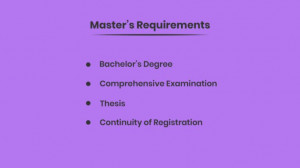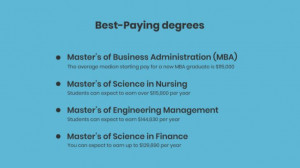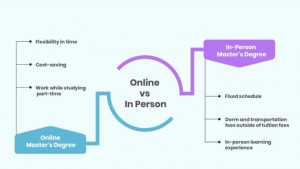Best Online Masters Degree Programs
Get detailed information about best online Masters degree programs in and their tuition, accreditation, career prospects, scholarships, admission details and much more
Online Masters Degree
A master's degree is the next level of education past a bachelor's degree. You usually pursue a master's degree related to the subject you earned your bachelor's in.
A master's degree in your hand proves that you have in-depth knowledge about a specific subject. This can increase the chances of you getting a job in a higher post right from the beginning of your career.
You can study for a master's degree using either the traditional on-campus method or by non-traditional methods such as a distance, part-time, or online education program.
A master's degree can be acquired in almost any subject, such as physics, marketing, finance, engineering, and psychology.
Some master's degrees don't require that you earn a bachelor's degree in the subject first. However, you'll need to have a bachelor's degree before starting the course of study. For example, to earn a Master in Business Administration (MBA), you can have a bachelor's degree in any subject.
Many master's degree programs let you specialize even further in a subject.
For example, a master's degree in physics has general concentrations like Computational Physics, General Physics, and Material Science. It provides research opportunities also in various areas of science.
A master's degree in marketing has specialized concentrations like International Business, Digital Marketing, Marketing Analytics, Marketing Management, etc.
A master's degree in engineering has specialized concentrations in Mechanical, Information Science, Electronics, Civil, etc.
Benefits of earning a master's degree
There are many reasons to consider pursuing a master's degree.
A master's degree program will give you the opportunity to continue your studies or return to school for additional learning. You'll gain even more knowledge about a subject, and you can make use of that knowledge in the future.
A master's degree will also make you more competitive in the job market.
According to the Bureau of Labor Statistics, the number of jobs that require a master's degree increased by 18% between 2012 and 2022. Even if you don't want a job that requires a degree beyond a bachelor's degree, more education won't hurt your chances.
Jobs that require higher levels of education also tend to pay more, so entering an online graduate program and earning a graduate degree can increase your income.
Earning a master's degree will also give you a valuable network.
Many programs, especially MBA programs, focus on helping you meet people and teaching you how to form connections. You can leverage your network down the road to find more job opportunities or to help your business grow.
Master's degree requirements
While the precise requirements to earn a master's degree will depend on the program you choose, there are a few relatively consistent requirements across schools.
The primary requirement is that you must already have an undergraduate degree. You usually can't skip earning a bachelor's degree and go straight for a master's.
However, some schools offer combined programs that let you earn a bachelor's degree and a master's degree at the same time or work toward a master's while finishing your bachelor's degree.
Most schools will also make you take a standardized test like the GRE. You'll have to submit your GRE score with your application.
Once you get into a graduate program, you have to complete a certain number of credit hours to earn your degree.
For example, Northeastern University requires that students complete 30 credit hours of work and a thesis while maintaining a 3.0 GPA to earn a degree.
Harvard Extension School, Harvard University's online master's degree program, requires that students complete twelve classes (48 credit hours), including a thesis, to earn a degree.
Typically, a master's program only requires that you take courses related to your field of study. You usually don't have to take core courses as you did to earn an undergraduate degree.
Best-paying master's degrees
One of the top reasons to enter a master's program is to improve your job prospects and increase your income.
Selecting an online degree program is particularly common for students who want to increase their income as they can keep their current job while pursuing a degree. Once an online student completes their online courses, they can start working toward a promotion or look for a new job.
Prospective students that want to increase their income through online learning might want to consider these degree programs:
Master of Business Administration (MBA)
A Master of Business Administration (MBA) program is one of the most popular and best-paying master's programs. An MBA program readies you for a management role in many different businesses.
Depending on your interests and previous education, you can use an MBA to find a role managing different aspects of a company, such as a computer science, IT, marketing, or sales team.
It may seem like you will miss out on networking and other things if you choose an online MBA program, but many schools find ways to offer a similar experience both online and in person.
The average median starting pay for a new MBA graduate is $115,000.
Master of Science in Nursing
If you're working in healthcare but don't want the time and expense of becoming a doctor, earning a Master of Science in Nursing is another way to advance your career.
Students often work toward becoming nurse anesthetists, who can assist with anesthesiology, or nurse practitioners, who can take on some of the duties typically reserved for doctors.
Students can expect to earn over $115,800 per year, depending on the specialization they choose.
Master of Engineering Management
A Master of Engineering Management prepares you for more advanced and difficult engineering projects.
For example, students may graduate into a role as an architectural and engineering manager, running a team that's responsible for designing and erecting buildings.
Students can expect to earn $144,830 per year after graduating with this degree.
Master of Science in Finance
If you're working in the world of finance, higher education can help you land higher-paying roles and give you more credibility.
Depending on your interests, this degree can prepare you to work as a manager at an investment firm or to work directly with clients as a financial advisor. You may choose to earn additional certifications to help you draw more clients.
You can also find an accounting program that will prepare you for higher-level roles as an accountant.
Depending on the role you choose, you can expect to earn up to $129,890 per year after earning this degree.
Online vs. in-person master's degrees
An online program has many advantages over in-person master's degree programs, but you might worry about missing out on some essential aspects of in-person learning.
While it's true that it can be hard to replicate the classroom experience online, the flexibility and cost-savings offered by an online master's program are significant.
Harvard, one of the top universities in the world, is a great example of this.
The tuition for a single year of study at the Harvard Graduate School of Education is $51,904. This is before other costs such as room and board and transportation.
At the Harvard Extension School, online learners must complete twelve courses to earn their degree. Each course costs $2,900 for a total cost of $34,800. The entire degree from Harvard's online program costs less than a single year of study for the in-person program.
Students in an online program also can avoid costs such as room and board in a dormitory.
Often, they can keep their jobs and study part-time, which means they won't lose income, making the effective cost of an online degree program even lower.
Online programs have other advantages to consider.
Often, an online graduate student will have the flexibility to watch lectures when they have the time, rather than having to stick to a set schedule.
Because many people pursue a master's degree after they've already started a career, this additional flexibility can be a major benefit of online programs.
Conclusion
A master's degree is a great way to make yourself more marketable to employers and increase your income.
If you're thinking about working toward a master's degree, consider an online degree program. They're often cheaper and more flexible than in-person classes while providing the same benefits.
If you're considering an online degree program and want to know how to pay for it, check out The College Monk's list of the best student loans.
Masters Degrees in Public Administration
Master of Arts
Liberty University
Lynchburg, Virginia
Public Administration Accreditation: Request Info
Avg Credits: 36
Avg Tuition: $ 20,340
Avg Federal grant awarded: $4,674
Avg Institutional grant awarded: $9,109
Graduation Rate: 51%
Specializations Offered: Public Policy
Total Programs in Public Administration (6)
Request InfoPublic Administration Accreditation: Request Info
Avg Credits: 33
Avg Tuition: $ 22,671
Avg Federal grant awarded: $4,941
Avg Institutional grant awarded: $9,681
Graduation Rate: 67%
Specializations Offered: Public Policy
Total Programs in Public Administration (1)
Request InfoWaldorf University
Forest city, Iowa
Public Administration Accreditation: Request Info
Avg Credits: 36
Avg Tuition: $ 13,140
Avg Federal grant awarded: $4,511
Avg Institutional grant awarded: $12,750
Graduation Rate: 23%
Specializations Offered: Emergency Management , Leadership
Total Programs in Public Administration (2)
Request InfoHofstra university
New York, New York
Public Administration Accreditation: Request Info
Avg Credits: 36
Avg Tuition: $ 1,292
Avg Federal grant awarded: $5,225
Avg Institutional grant awarded: $21,631
Graduation Rate: 64%
Specializations Offered: Public Relations
Total Programs in Public Administration (1)
Request InfoMasters Degrees in Theology
Master of Arts
Liberty University
Lynchburg, Virginia
Theology Accreditation: Request Info
Avg Credits: 50
Avg Tuition: $ 27,980
Avg Federal grant awarded: $4,674
Avg Institutional grant awarded: $9,109
Graduation Rate: 51%
Specializations Offered: Christian Ministry , Biblical Studies +1 more
Total Programs in Theology (22)
Request InfoGrand Canyon University (GCU)
Phoenix, Arizona
Theology Accreditation: Request Info
Avg Credits: 38
Avg Tuition: $ 19,000
Avg Federal grant awarded: $4,666
Avg Institutional grant awarded: $8,227
Graduation Rate: 43%
Specializations Offered: Leadership
Total Programs in Theology (1)
Request InfoCreighton University
Omaha, Nebraska
Theology Accreditation: Request Info
Avg Credits: 41
Avg Tuition: $ 17,425
Avg Federal grant awarded: $5,351
Avg Institutional grant awarded: $19,003
Graduation Rate: 79%
Specializations Offered: Christian Ministry
Total Programs in Theology (2)
Request InfoSaint Leo University
St. Leo, Florida
Theology Accreditation: Request Info
Avg Credits: 36
Avg Tuition: $ 17,280
Avg Federal grant awarded: $4,959
Avg Institutional grant awarded: $9,430
Graduation Rate: 40%
Also See: Programs & Tuitions
Total Programs in Theology (1)
Request InfoMasters Degrees in Literature
Master of Arts
Ohio University
Athens, Ohio
Literature Accreditation: Request Info
Avg Credits: 32
Avg Tuition: $ 7,776
Avg Federal grant awarded: $4,481
Avg Institutional grant awarded: $4,558
Graduation Rate: 64%
Also See: Programs & Tuitions
Total Programs in Literature (1)
Request InfoUnion Institute and University
Cincinnati, Ohio
Literature Accreditation: Request Info
Avg Credits: 36
Avg Tuition: $ 26,928
Specializations Offered: Writing
Total Programs in Literature (1)
Request InfoEmporia State University
Emporia, Kansas
Literature Accreditation: Request Info
Avg Credits: 18
Avg Tuition: $ 4,230
Avg Federal grant awarded: $4,469
Avg Institutional grant awarded: $2,646
Graduation Rate: 44%
Also See: Programs & Tuitions
Total Programs in Literature (2)
Request InfoNorthern Arizona University (NAU)
Flagstaff, Arizona
Literature Accreditation: Request Info
Avg Credits: 36
Avg Tuition: $ 15,300
Avg Federal grant awarded: $4,634
Avg Institutional grant awarded: $7,533
Graduation Rate: 53%
Specializations Offered: Writing
Total Programs in Literature (2)
Request InfoMasters Degrees in Sociology
Master of Arts
Sociology Accreditation: Request Info
Avg Credits: 30
Avg Tuition: $ 17,610
Avg Federal grant awarded: $4,941
Avg Institutional grant awarded: $9,681
Graduation Rate: 67%
Also See: Programs & Tuitions
Total Programs in Sociology (1)
Request InfoSaybrook University
Pasadena, California
Sociology Accreditation: Request Info
Avg Credits: 35
Avg Tuition: Request Info
Also See: Programs & Tuitions
Total Programs in Sociology (2)
Request InfoThe University of Alabama at Birmingham (UAB)
Birmingham, Alabama
Sociology Accreditation: Request Info
Avg Credits: 30
Avg Tuition: $ 11,250
Avg Federal grant awarded: $5,318
Avg Institutional grant awarded: $7,183
Graduation Rate: 53%
Also See: Programs & Tuitions
Total Programs in Sociology (1)
Request InfoIdaho State University
Pocatello, Idaho
Sociology Accreditation: Request Info
Avg Credits: 33
Avg Tuition: $ 15,510
Avg Federal grant awarded: $4,463
Avg Institutional grant awarded: $4,329
Graduation Rate: 29%
Also See: Programs & Tuitions
Total Programs in Sociology (1)
Request InfoMasters Degrees in Behavioral Sciences
Master of Arts
Liberty University
Lynchburg, Virginia
Behavioral Sciences Accreditation: Request Info
Avg Credits: 48
Avg Tuition: $ 27,120
Avg Federal grant awarded: $4,674
Avg Institutional grant awarded: $9,109
Graduation Rate: 51%
Specializations Offered: Counseling , Writing
Total Programs in Behavioral Sciences (2)
Request InfoNorthcentral University (NCU)
San Diego, California
Behavioral Sciences Accreditation: Request Info
Avg Credits: 60
Avg Tuition: $ 43,118
Avg Federal grant awarded: $4,226
Avg Institutional grant awarded: $10,202
Graduation Rate: 48%
Specializations Offered: Marriage and Family therapy , Child Psychology +1 more
Total Programs in Behavioral Sciences (6)
Request InfoBehavioral Sciences Accreditation: Request Info
Avg Credits: 60
Avg Tuition: $ 37,620
Avg Federal grant awarded: $3,159
Avg Institutional grant awarded: $15,429
Graduation Rate: 58%
Specializations Offered: Counseling
Total Programs in Behavioral Sciences (1)
Request InfoNew York University (NYU)
New York, New York
Behavioral Sciences Accreditation: Request Info
Avg Credits: 54
Avg Tuition: $ 76,248
Avg Federal grant awarded: $5,409
Avg Institutional grant awarded: $30,346
Graduation Rate: 85%
Specializations Offered: Counseling , School Counseling
Total Programs in Behavioral Sciences (2)
Request Info


















